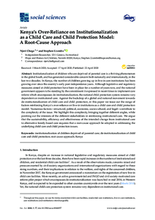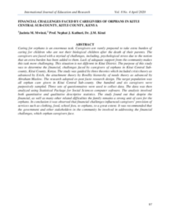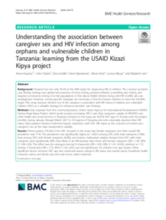Displaying 421 - 430 of 1609
Child's i Foundation in Uganda has donated bicycles, smartphones, face masks and bottles of sanitizer to volunteers in Makindye division, Kampala to support them in their work to "sensitize residents about the spread of COVID-19" and so that the volunteers can "reach places that are inaccessible" and give timely reports on the needs of the community, particularly vulnerable children and families, according to this article from the Daily Monitor.
This article from the Thomson Reuters Foundation reports on the increase of female genital mutilation (FGM) in Somalia as a result of the lockdowns enacted to curb the spread of the coronavirus.
This qualitative study used a case study design to explore the manifestations of the core psycho-social deficits associated with children domiciled in child headed households.
In this online event, Family for Every Child members FSCE (Ethiopia), The Mulberry Bush (UK), Praajak (India) and CSID (Bangladesh) discussed children's care in the context of COVID-19.
This blog post from the UN Sustainable Development Group notes the rise in cases of gender-based violence (GBV) and violence against children (VAC) in Kenya, in light of the COVID-19 pandemic, and calls for immediate action to address this "shadow pandemic."
This study was carried out to determine the pattern of dermatological conditions and contributing factors among children living in orphanages in Dar es Salaam, Tanzania.
This paper teases out the range of factors reinforcing Kenya’s over-reliance on live-in institutions as a child care and child protection model.
The purpose of this study was to determine the financial challenges faced by caregivers of orphans in Kitui Central Subcounty, Kitui County, Kenya.
This study assesses whether sex of the caregiver is associated with HIV status of orphans and vulnerable children (OVC) as a valuable strategy for enhanced pediatric case findings.
The purpose of this report is to provide analysis and policy implications to assist the African Union (AU), Regional Economic Communities (RECs), Member States and Development Partners in decision-making and in the implementation of peace and security related instruments.





